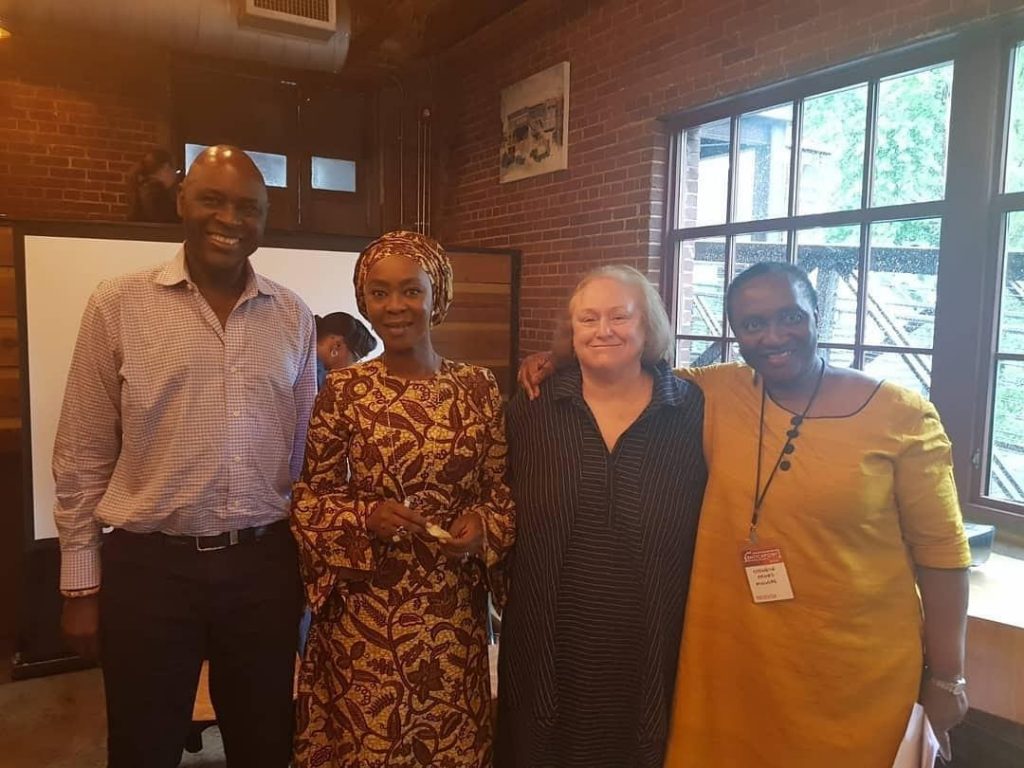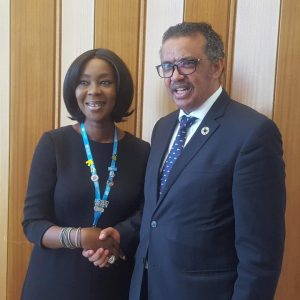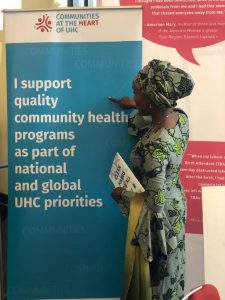Categories
Ahead of the United Nations High-Level Meeting on Universal Health Coverage in New York on Monday, Toyin Saraki, Founder-President of the Wellbeing Foundation Africa, co-chaired a technical session on women’s rights and equality in global health in North Carolina, bringing together leading experts from the sector.
The session was led by Mrs Saraki at SwitchPoint 2019, the annual gathering of global humanitarian experts hosted by IntraHealth International, alongside Pape Gaye, President and Chief Executive Officer of IntraHealth International; Constance Newman, Senior Team Leader, Gender Equality and Health at IntraHealth International; and moderated by Stembile Mugore, Senior advisor for health sector performance and sustainability at IntraHealth International.

Mrs Saraki expressed her hope that the technical session would lead to a step-change in the push for equality in the global health sector at large, from leadership positions to the frontline healthcare workforce, stating that:
“Women make up 70% of the health and social-sector workforce, yet half of women’s contributions to global health are unpaid. Women are also under-represented in global health leadership, taking on only 25% of senior positions.”
“We have identified Global Health 50/50 reports which demonstrate that organizations from the United Nations system; bilateral and multilateral development institutions; philanthropic organizations and funders; civil society and nongovernmental organizations; public-private partnerships; and the private sector still have a long way to go to reflect the values they are trying to themselves instil. I do however salute our male allies – for instance, when the Director-General of the World Health Organization, Dr Tedros Adhanom Ghebreyesus, became the first African to succeed to that role, he established a senior leadership team which consists of more than 60% women.”
“Dr Tedros is also correct to point out that it is often health workers who are the first responders to violence and deal with its consequences, and that investments in creating jobs for health workers are also investments in gender equality.”
“IntraHealth International has also led the way in its deliberate affirmation of female leadership: where such organizations have been trailblazers, it is now incumbent upon nation states to follow suit as part of national and global health priorities.”

Commenting ahead of the United Nations Multi-Stakeholder Hearings on Universal Health Coverage holding in New York, Mrs Saraki added:
“Community healthcare workers are at the front line of key interventions, including immunization and in the fight against measles, but we have identified research which shows how they are often systematically taken advantage of in the most distressing of ways. This has to change.”
“The challenges faced by midwives who lead the community care continuum are no different to the barriers restraining women from global health leadership. In the World Health Organization’s 2016 report ‘Midwives’ Voices Midwives Realities,’ which documented the voices and experiences of 2,470 midwifery personnel who provide care to childbearing women and their newborns in 93 countries, it was pointed out that midwifery plays a “vital” role, and when provided by educated, trained, regulated, licensed midwives, is associated with “improved quality of care and rapid and sustained reductions in maternal and newborn mortality.”

The report also highlights however “that it is not just about fixing financial resources or health systems, but about redressing complex hierarchies of power and transforming gender dynamics. Respondents highlighted that “power, agency and status” is important for midwifery personnel if progress is to be made in delivering quality care.”
“We must achieve proper leadership representation for women in the global health space throughout Africa and the world – but also in every legislature, and at the very highest level of politics, business and civil society. We can commend our male allies whilst appreciating the need for women to lead the way for women ourselves.”
“The Wellbeing Foundation Africa, as a member of the United Nations Economic and Social Council (ECOSOC) and the UN Global Compact, is commited to achieving universal health coverage through a model focused on primary healthcare model – along with the right training and support for healthcare workers, a comprehensive accountability structure, and safe water, sanitation and hygiene conditions.”
Mrs Saraki is also Special Advisor to the Independent Advisory Group to the World Health Organization Regional Office for Africa and the Global Goodwill Ambassador to the International Confederation of Midwives.
Categories